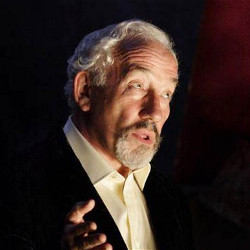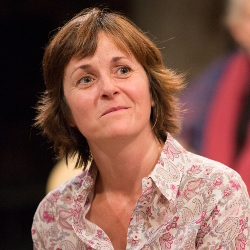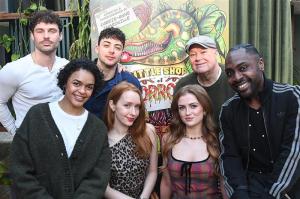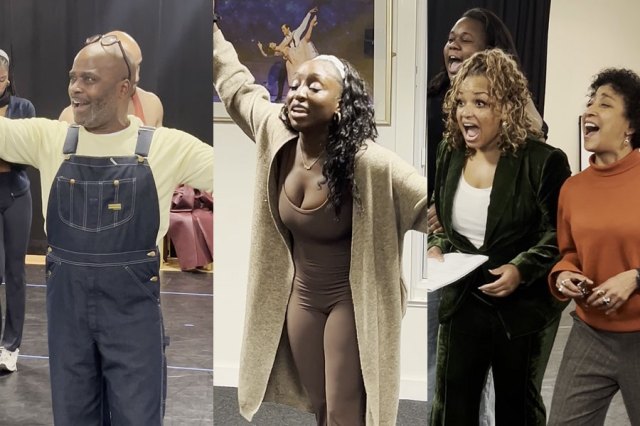Michael Coveney: Simon Callow and Rory Kinnear join the ranks of fine playwrights
Actors are not often good writers, but many of the best playwrights – Shakespeare, Noel Coward, Harold Pinter, John Osborne and Peter Nichols – have been actors, and two more of them, Simon Callow and Rory Kinnear, are currently making their mark as champion scribes for the stage.
Callow, we know, can write, so the very high quality of his solo show as Richard Wagner at Covent Garden is no great surprise, perhaps; but Rory Kinnear, taking a break from Iago at the National, with his debut play, The Herd, at the Bush (scene of many of Callow's early triumphs) is a revelation.

Inside Wagner’s Head, the title of Simon Callow’s one-man show in the Linbury Theatre in the Royal Opera House, Covent Garden, is probably not the best place in the world to be; nor is the Linbury Theatre in the Royal Opera House, Covent Garden.
I really felt for Simon at yesterday's matinee as he battled against Wagnerian demons as well as the clumping up and down on the noisy stairways, the banging of doors and the general shuffling about of a decidedly senior audience. He looked distinctly uncomfortable and nearly fell off a tea chest as he approached another Wagnerian summit of climactic anguish.
The show is a vivid, amusingly written and highly informative meditation on Wagner from cradle to grave, Callow unleashing a lifelong obsession with the man and a fascination as inspired as in his other monomaniac solo shows on Charles Dickens and Shakespeare. Those were written for him by Peter Ackroyd and Jonathan Bate. Simon's written this one for the ROH's Deloitte Ignite Wagner bicentenary season (the composer was born in 1813) curated by his friend Stephen Fry, and the Theatre Royal, Plymouth, where director Simon Stokes (an old Bush colleague of his) will present it in December.
I love Wagner, but I've never been to Bayreuth, didn't hear the reportedly astonishing performances conducted at this year's Proms by Daniel Barenboim and have never sat through the complete Ring Cycle (though I have read War and Peace and the whole of Proust). My favourite opera is Tristan and Isolde, but I love The Flying Dutchman and Die Meistersinger and Parsifal, too, and have a lot of time (you need it) for Lohengrin. Simon only had to close his eyes and conjure the long portentous rumble at the end of The Ring, the magical shimmering of strings in the prelude of Das Reingold, and we were away.
He rightly says how Wagner did nothing less than change music, all music, for ever and marvels at how such an unpromising musical autodidact and coarse-grained spirit hewed his own talent and genius out of his inner being (Callow's ditched what was reported initially as a Yorkshire accent in favour of a more general bumpkin roughness; it works very well).

© Mark Douet
Designer Robin Don clutters the stage with Wagnerian props, piles of books, a keyboard which Simon plays awkwardly from time to time (Wagner was a rotten pianist, so that's OK) while fretting in a black suit – why not loosen up in a freer fitting tunic; Callow's a sweaty actor and it's best not to see too much of it – about the great man's struggles, the interruptions to the completion of The Ring, his patronage – this part is wonderful – by the young King Ludwig of Bavaria, his anti-Semitism (conclusion: he dug so deep into himself he excavated shit with the gold) and his chaotic private life, partly resolved in his second happy marriage to Franz Liszt's tall and beaky daughter Cosima ("They were of one mind – his!").
Kinnear's play has an emotional roller-coaster element, too, in showing a family torn apart in dealing with the tragedy of a disabled child, now grown up; Kinnear is using some of his own personal family experience, but there's nothing mawkish or self-indulgent about the play, and most of it is directly applicable to our own experiences of family life, I'm sure.
But it's quite a long time since I've sat through something so boiled in anger and upset in a theatre, and there's one extraordinary sequence towards the end when the play suddenly veers into some sort of emotional truce and accommodation, only for it to crash back into the reality of what usually happens.
Nicholas Hytner turned up in Shepherd's Bush to lend support to his Hamlet and Iago turned writer ("Words, words, words"), accompanied by Lesley Manville who tells me that her upcoming Ghosts (in which she plays Mrs Alving, directed by Richard Eyre at the Almeida) will be all done and dusted in ninety minutes; that's the spirit!












